Battling Food Losses and Waste in Saudi Arabia: Mobilizing Regional Efforts and Blending Indigenous Knowledge to Address Global Food Security Challenges
Abstract
:1. Introduction
2. Materials and Methods: Fulfilling G20 Presidency as Leader in Tackling FLW
“MACS emphasized the importance of science and technology, pre- and post-harvest and throughout the food value chain, to reduce FLW including the control of plant and animal diseases, enhanced storage technologies, innovative packaging solutions, prolonged shelf life, creation of value added byproducts, and improved management practices”.
To support FAO, IFPRI, and other relevant international organizations in their efforts to develop a platform related to FLW, MACS agreed to share information and experiences relating to agricultural science and technology, in measuring and reducing FLW. MACS emphasized the value of having a common definitional and measurement framework as noted by Agriculture Ministers.
MACS agreed that a subset of members, led by Germany and in consultation with FAO and IFPRI, would conduct a preliminary mapping of their existing science and technology activities related to FLW, so as to contribute to enhanced information sharing and global coordination…” [5].
- Germany: Sustainability assessment methodology to evaluate FLW prevention measures for monitoring purposes and as information basis for decision makers.
- UK: Innovative public-private partnerships to achieve 27% reduction in food waste. The strategies developed in the UK, delivered through wide-ranging partnerships supported by Governments and industry are effective—but more citizens and businesses must be reached and motivated to act.
- Italy: Value from food chains and waste reduction: Complementary approaches for global sustainable food systems and bio-based economy.
- USA: Food waste and the Water-Energy-Food Nexus: Water and energy footprints of produced and landfilled food waste: A Florida case study.
3. Results and Discussion
3.1. Status of Food System in the Kingdom of Saudi Arabia
3.2. Extent of Food Loss and Waste in the Kingdom of Saudi Arabia
3.3. Stage-Specific Policies to Overcome Food Losses along the Entire Food Supply Chain
3.3.1. Pests and Diseases Management Program to Reduce Food Losses
3.3.2. Cold Chain Strategy to Reduce Food Losses
3.4. Food Waste Drivers and Strategies to Overcome Food Waste along the Food Supply Chain
3.4.1. Food Processing Approaches to Reduce Food Waste
3.4.2. Food Recycling Potential Opportunities for Wasted Food
3.5. Guidelines to Tackle Food Loss and Waste
3.5.1. Enabling Policy Reforms for Quantifying FLW Baseline, Setting Intermediate FLW Targets, and Stopping Unfair Trading Practices
3.5.2. Mobilizing Regional and Global Efforts through Collaborative Initiatives
3.5.3. Promoting and Developing Circular Economy Practices for Waste Utilization
3.5.4. Changing Behavior to Reduce Hospitality Waste
3.5.5. Awareness Campaigns to Reduce Household Food Waste
3.5.6. Promoting the Concept of Food Banks for Surplus Food Redistribution
3.5.7. Research and Innovations
4. Conclusions
Author Contributions
Funding
Institutional Review Board Statement
Informed Consent Statement
Data Availability Statement
Acknowledgments
Conflicts of Interest
References
- G20 2015 Istanbul Summit, Turkey. Agriculture Ministers Final Communique. In Proceedings of the G20 Agriculture Ministers Meeting, Istanbul, Turkey, 8 May 2015. Available online: http://www.g20.utoronto.ca/2015/150508-agriculture.html (accessed on 25 May 2021).
- SAGO. Saudi FLW Baseline: Food Loss and Waste Index in Kingdom of Saudi Arabia; Saudi Grains Organization: Riyadh, Saudi Arabia, 2019. [Google Scholar]
- FAO. The State of Food and Agriculture: Moving Forward on Food Loss and Waste Reduction; FAO: Rome, Italy, 2019; Available online: http://www.fao.org/policy-support/tools-and-publications/resources-details/en/c/1242090/ (accessed on 26 May 2021).
- G20 Saudi Arabia 2020. Riyadh Summit, Leaders’ Declaration. 2020. Available online: http://www.g20.utoronto.ca/2020/2020-g20-leaders-declaration-1121.html. (accessed on 1 June 2021).
- Fourth Meeting of G20 Agricultural Chief Scientists. 2015. Available online: https://www.macs-g20.org/fileadmin/macs/Communiques/MACS_2015_Communique_final.pdf (accessed on 25 May 2021).
- FAO. Food Wastage Footprint-Impacts On Natural Resources; FAO: Rome, Italy, 2013; ISBN 978-92-5-107752-8. [Google Scholar]
- MEWA. International Virtual Workshop on Water, Energy, Food Nexus. In Proceedings of the Meeting of the G20 Agricultural Chief Scientists, AI Khobar, Saudi Arabia. 2020. Available online: https://www.macs-g20.org/annual-meetings/previous-meetings/saudi-arabia-2020/ (accessed on 3 June 2021).
- WFP. Global Hunger Map Live. Available online: https://hungermap.wfp.org/ (accessed on 15 July 2021).
- FAO. Suite of Food Security Indicators. Available online: http://www.fao.org/faostat/en/#data/FS/visualize (accessed on 7 July 2021).
- General Authority of Statistics, Kingdom of Saudi Arabia for the Year. 2018. Available online: https://www.stats.gov.sa/en (accessed on 28 May 2021).
- Global Food Security Index. The Economist: Intelligence Unit & Supported by Corteva AgriscienceTM. Available online: https://foodsecurityindex.eiu.com/ (accessed on 15 June 2021).
- Food Sustainability Index Developed by the Economist: Intelligent Unit with Barilla Center For Food & Nutrition (BCFN). Fixing Food: Best Practices Towards the Sustainable Development Goals. 2018. Available online: https://foodsustainability.eiu.com/country-ranking (accessed on 3 June 2021).
- Food Sustainability Index developed by the Economist: Intelligent Unit with Barilla Center For Food & Nutrition (BCFN). Fixing Food 2021: An Opportunity for G20 Countries to Lead the Way. Available online: https://foodsustainability.eiu.com/g20/fixing-food-2021-infographic/ (accessed on 15 July 2021).
- Gustavsson, J.; Cederberg, C.; Ulf, S.; van Otterdijk, R.; Alexandre, M. Global Food Losses and Food Waste–Extent, Causes and Prevention; Food And Agriculture Organization Of The United Nations: Rome, Italy, 2011; ISBN 978-92-5-107205-9. [Google Scholar]
- FAO. Indicator 12.3.1-Global Food Loss and Waste: Sub-Indicator 12.3.1.a-Food Loss Index. Available online: http://www.fao.org/sustainable-development-goals/indicators/1231/en/ (accessed on 3 June 2021).
- Al-Ayedh, H.; Hussain, A.; Rizwan-ul-Haq, M.; Al-Jabr, A.M. Status of insecticide resistance in field-collected populations of Rhynchophorus ferrugineus (Olivier) (Coleoptera: Curculionidae). Int. J. Agric. Biol. 2016, 18, 103–110. [Google Scholar] [CrossRef]
- Hussain, A.; Rizwan-ul-Haq, M.; Al-Jabr, A.M.; Al-Ayied, H.Y. Managing invasive populations of red palm weevil: A worldwide perspective. J. Food Agric. Environ. 2013, 11, 456–463. [Google Scholar]
- Hussain, A.; Rizwan-ul-haq, M.; AlJabr, A.M.; Al-Ayedh, H. Lethality of sesquiterpenes reprogramming red palm weevil detoxification mechanism for natural novel biopesticide development. Molecules 2019, 24, 1648. [Google Scholar] [CrossRef] [PubMed] [Green Version]
- Hussain, A.; AlJabr, A.M.; Al-Ayedh, H. Development-Disrupting chitin synthesis inhibitor, novaluron, reprogramming the chitin degradation mechanism of red palm weevils. Molecules 2019, 24, 4304. [Google Scholar] [CrossRef] [Green Version]
- FAOSTAT. Food and Agricultural Commodities Production. Available online: http://www.fao.org/faostat/en/#data/QC/visualize (accessed on 6 June 2021).
- Research, K. Saudi Arabia Cold Chain Market future Outlook to 2023: Ken Research. Available online:https://researchforecast.com/saudi-arabia-cold-chain-market-future-outlook-to-2023-ken-research/ (accessed on 3 June 2021).
- Spang, E.S.; Moreno, L.C.; Pace, S.A.; Achmon, Y.; Donis-Gonzalez, I.; Gosliner, W.A.; Jablonski-Sheffield, M.P.; Momin, M.A.; Quested, T.E.; Winans, K.S.; et al. Food Loss and waste: Measurement, drivers, and solutions. Annu. Rev. Environ. Resour. 2019, 44, 117–156. [Google Scholar] [CrossRef]
- Kosseva, M.R. Chapter 3 Processing of Food Wastes. In Advances in Food and Nutrition Research; Elsevier: Amsterdam, The Netherlands, 2009; pp. 57–136. [Google Scholar]
- Balkhi, K. 2018. Available online: https://www.thenationalnews.com/business/ideas-to-chew-on-how-to-end-food-waste-in-saudi-arabia-1.705509 (accessed on 28 May 2021).
- Spiker, M.L.; Hiza, H.A.B.; Siddiqi, S.M.; Neff, R.A. Wasted Food, wasted nutrients: Nutrient loss from wasted food in the united states and comparison to gaps in dietary intake. J. Acad. Nutr. Diet. 2017, 117, 1031–1040.e22. [Google Scholar] [CrossRef] [PubMed] [Green Version]
- Jin, Q.; Yang, L.; Poe, N.; Huang, H. Integrated processing of plant-derived waste to produce value-added products based on the biorefinery concept. Trends Food Sci. Technol. 2018, 74, 119–131. [Google Scholar] [CrossRef]
- Yam, K.L.; Takhistov, P.T.; Miltz, J. Intelligent packaging: Concepts and applications. J. Food Sci. 2005, 70, 1–10. [Google Scholar] [CrossRef]
- Floros, J.D.; Newsome, R.; Fisher, W.; Barbosa-Cánovas, G.V.; Chen, H.; Dunne, C.P.; German, J.B.; Hall, R.L.; Heldman, D.R.; Karwe, M.V.; et al. Feeding the world today and tomorrow: The importance of food science and technology. Compr. Rev. Food Sci. Food Saf. 2010, 9, 572–599. [Google Scholar] [CrossRef] [PubMed]
- Sagar, N.A.; Pareek, S.; Sharma, S.; Yahia, E.M.; Lobo, M.G. Fruit and vegetable waste: Bioactive compounds, their extraction, and possible utilization. Compr. Rev. Food Sci. Food Saf. 2018, 17, 512–531. [Google Scholar] [CrossRef] [Green Version]
- Thi, N.B.D.; Kumar, G.; Lin, C.-Y. An overview of food waste management in developing countries: Current status and future perspective. J. Environ. Manag. 2015, 157, 220–229. [Google Scholar] [CrossRef] [PubMed]
- Eriksson, M.; Strid, I.; Hansson, P.-A. Carbon footprint of food waste management options in the waste hierarchy–a Swedish case study. J. Clean. Prod. 2015, 93, 115–125. [Google Scholar] [CrossRef]
- Mirabella, N.; Castellani, V.; Sala, S. Current options for the valorization of food manufacturing waste: A review. J. Clean. Prod. 2014, 65, 28–41. [Google Scholar] [CrossRef] [Green Version]
- Lin, C.S.K.; Koutinas, A.A.; Stamatelatou, K.; Mubofu, E.B.; Matharu, A.S.; Kopsahelis, N.; Pfaltzgraff, L.A.; Clark, J.H.; Papanikolaou, S.; Kwan, T.H.; et al. Current and future trends in food waste valorization for the production of chemicals, materials and fuels: A global perspective. Biofuels Bioprod. Biorefining 2014, 8, 686–715. [Google Scholar] [CrossRef]
- Henríquez, C.; Speisky, H.; Chiffelle, I.; Valenzuela, T.; Araya, M.; Simpson, R.; Almonacid, S. Development of an ingredient containing apple peel, as a source of polyphenols and dietary fiber. J. Food Sci. 2010, 75, H172–H181. [Google Scholar] [CrossRef]
- Huber, G.M.; Rupasinghe, H.P.V. Phenolic profiles and antioxidant properties of apple skin extracts. J. Food Sci. 2009, 74, C693–C700. [Google Scholar] [CrossRef] [PubMed]
- Wolfe, K.L.; Liu, R.H. Apple peels as a value-added food ingredient. J. Agric. Food Chem. 2003, 51, 1676–1683. [Google Scholar] [CrossRef] [PubMed]
- Osma, J.F.; Toca Herrera, J.L.; Rodríguez Couto, S. Banana skin: A novel waste for laccase production by Trametes pubescens under solid-state conditions. Application to synthetic dye decolouration. Dye. Pigment. 2007, 75, 32–37. [Google Scholar] [CrossRef]
- Unakal, C.; Kallur, R.I.; Kaliwal, B.B. Production of α-amylase using banana waste by Bacillus subtilis under solid state fermentation. Eur. J. Exp. Biol. 2012, 2, 1044–1052. [Google Scholar]
- Bakowska-Barczak, A.M.; Schieber, A.; Kolodziejczyk, P. Characterization of canadian black currant (Ribes nigrum L.) seed oils and residues. J. Agric. Food Chem. 2009, 57, 11528–11536. [Google Scholar] [CrossRef]
- Górecka, D.; Pachołek, B.; Dziedzic, K. Raspberry pomace as a potential fiber source for cookies enrichment. Acta Sci. Pol. Technol. Aliment. 2010, 9, 451–462. [Google Scholar]
- Tarasevičienė, Ž.; Čechovičienė, I.; Jukniūtė, K.; Šlepetienė, A.; Paulauskienė, A. Qualitative properties of cookies enriched with berries pomace. Food Sci. Technol. 2020, in press. [Google Scholar] [CrossRef]
- Fernández-López, J.; Fernández-Ginés, J.M.; Aleson-Carbonell, L.; Sendra, E.; Sayas-Barberá, E.; Pérez-Alvarez, J.A. Application of functional citrus by-products to meat products. Trends Food Sci. Technol. 2004, 15, 176–185. [Google Scholar] [CrossRef]
- Viuda-martos, M.; Fernandez-lopez, J.; Sayas-barbera, E.; Sendra, E.; Perez-alvarez, J.A. Physicochemical characterization of the orange juice waste water of a citrus by-product. J. Food Process. Preserv. 2011, 35, 264–271. [Google Scholar] [CrossRef]
- de Moraes Crizel, T.; Jablonski, A.; de Oliveira Rios, A.; Rech, R.; Flôres, S.H. Dietary fiber from orange byproducts as a potential fat replacer. LWT-Food Sci. Technol. 2013, 53, 9–14. [Google Scholar] [CrossRef]
- Anticona, M.; Blesa, J.; Frigola, A.; Esteve, M.J. High biological value compounds extraction from citrus waste with non-conventional methods. Foods 2020, 9, 811. [Google Scholar] [CrossRef]
- Gómez-Mejía, E.; Rosales-Conrado, N.; León-González, M.E.; Madrid, Y. Citrus peels waste as a source of value-added compounds: Extraction and quantification of bioactive polyphenols. Food Chem. 2019, 295, 289–299. [Google Scholar] [CrossRef]
- Ferri, M.; Vannini, M.; Ehrnell, M.; Eliasson, L.; Xanthakis, E.; Monari, S.; Sisti, L.; Marchese, P.; Celli, A.; Tassoni, A. From winery waste to bioactive compounds and new polymeric biocomposites: A contribution to the circular economy concept. J. Adv. Res. 2020, 24, 1–11. [Google Scholar] [CrossRef]
- Fia, G.; Bucalossi, G.; Gori, C.; Borghini, F.; Zanoni, B. Recovery of bioactive compounds from unripe red grapes (cv. Sangiovese) through a green extraction. Foods 2020, 9, 566. [Google Scholar] [CrossRef] [PubMed]
- Martin-Cabrejas, M.A.; Esteban, R.M.; Lopez-Andreu, F.J.; Waldron, K.; Selvendran, R.R. Dietary fiber content of pear and kiwi pomaces. J. Agric. Food Chem. 1995, 43, 662–666. [Google Scholar] [CrossRef]
- Tunchaiyaphum, S.; Eshtiaghi, M.N.; Yoswathana, N. Extraction of bioactive compounds from mango peels using green technology. Int. J. Chem. Eng. Appl. 2013, 194–198. [Google Scholar] [CrossRef] [Green Version]
- Torres-León, C.; Rojas, R.; Contreras-Esquivel, J.C.; Serna-Cock, L.; Belmares-Cerda, R.E.; Aguilar, C.N. Mango seed: Functional and nutritional properties. Trends Food Sci. Technol. 2016, 55, 109–117. [Google Scholar] [CrossRef]
- Rolim, P.M.; Seabra, L.M.J.; de Macedo, G.R. Melon by-products: Biopotential in human health and food processing. Food Rev. Int. 2020, 36, 15–38. [Google Scholar] [CrossRef]
- Tapia-Quirós, P.; Montenegro-Landívar, M.F.; Reig, M.; Vecino, X.; Alvarino, T.; Cortina, J.L.; Saurina, J.; Granados, M. Olive mill and winery wastes as viable sources of bioactive compounds: A study on polyphenols recovery. Antioxidants 2020, 9, 1074. [Google Scholar] [CrossRef] [PubMed]
- Galanakis, C.M.; Kotsiou, K. Recovery of bioactive compounds from olive mill waste. In Olive Mill Waste; Elsevier: Amsterdam, The Netherlands, 2017; pp. 205–229. [Google Scholar]
- Sepúlveda, L.; Romaní, A.; Aguilar, C.N.; Teixeira, J. Valorization of pineapple waste for the extraction of bioactive compounds and glycosides using autohydrolysis. Innov. Food Sci. Emerg. Technol. 2018, 47, 38–45. [Google Scholar] [CrossRef] [Green Version]
- Azizan, A.; Lee, A.X.; Abdul Hamid, N.A.; Maulidiani, M.; Mediani, A.; Abdul Ghafar, S.Z.; Zolkeflee, N.K.Z.; Abas, F. Potentially bioactive metabolites from pineapple waste extracts and their antioxidant and α-glucosidase inhibitory activities by 1H NMR. Foods 2020, 9, 173. [Google Scholar] [CrossRef] [Green Version]
- Schieber, A.; Stintzing, F.; Carle, R. By-products of plant food processing as a source of functional compounds—recent developments. Trends Food Sci. Technol. 2001, 12, 401–413. [Google Scholar] [CrossRef]
- Waldron, K. Useful ingredients from onion waste. Food Sci. Technol. 2001, 15, 38–41. [Google Scholar]
- Benítez, V.; Mollá, E.; Martín-Cabrejas, M.A.; Aguilera, Y.; López-Andréu, F.J.; Cools, K.; Terry, L.A.; Esteban, R.M. Characterization of industrial onion wastes (Allium cepa L.): Dietary fibre and bioactive compounds. Plant Foods Hum. Nutr. 2011, 66, 48–57. [Google Scholar] [CrossRef] [Green Version]
- Obidziński, S.; Dołżyńska, M.; Kowczyk-Sadowy, M.; Jadwisieńczak, K.; Sobczak, P. Densification and fuel properties of onion husks. Energies 2019, 12, 4687. [Google Scholar] [CrossRef] [Green Version]
- Szabo, K.; Cătoi, A.-F.; Vodnar, D.C. Bioactive compounds extracted from tomato processing by-products as a source of valuable nutrients. Plant Foods Hum. Nutr. 2018, 73, 268–277. [Google Scholar] [CrossRef]
- Fărcaş, A.C.; Socaci, S.A.; Michiu, D.; Biriş, S.; Tofană, M. Tomato waste as a source of biologically active compounds. Bull. Univ. Agric. Sci. Vet. Med. Cluj Napoca Food Sci. Technol. 2019, 76, 85. [Google Scholar] [CrossRef] [Green Version]
- Nour, V.; Panaite, T.; Ropota, M.; Turcu, R.; Trandafir, I.; Corbu, A. Nutritional and bioactive compounds in dried tomato processing waste. CyTA J. Food 2018, 16, 222–229. [Google Scholar] [CrossRef]
- Martinez-Fernandez, J.S.; Seker, A.; Davaritouchaee, M.; Gu, X.; Chen, S. Recovering valuable bioactive compounds from potato peels with sequential hydrothermal extraction. Waste Biomass Valorization 2021, 12, 1465–1481. [Google Scholar] [CrossRef]
- Venturi, F.; Bartolini, S.; Sanmartin, C.; Orlando, M.; Taglieri, I.; Macaluso, M.; Lucchesini, M.; Trivellini, A.; Zinnai, A.; Mensuali, A. Potato peels as a source of novel green extracts suitable as antioxidant additives for fresh-Cut fruits. Appl. Sci. 2019, 9, 2431. [Google Scholar] [CrossRef] [Green Version]
- Calcio Gaudino, E.; Colletti, A.; Grillo, G.; Tabasso, S.; Cravotto, G. Emerging processing technologies for the recovery of valuable bioactive compounds from potato peels. Foods 2020, 9, 1598. [Google Scholar] [CrossRef]
- Madhumithah, C.G.; Krithiga, R.; Sundaram, S.; Sasikumar, C.S.; Guhathakurta, S.; Cherian, K.M. Utilization of Vegetable Wastes for Production of Protease by Solid State Fermentation Using Aspergillus niger. World J. Agric. Sci. 2011, 7, 550–555. [Google Scholar]
- Khedkar, M.A.; Nimbalkar, P.R.; Chavan, P.V.; Chendake, Y.J.; Bankar, S.B. Cauliflower waste utilization for sustainable biobutanol production: Revelation of drying kinetics and bioprocess development. Bioprocess Biosyst. Eng. 2017, 40, 1493–1506. [Google Scholar] [CrossRef] [PubMed]
- Jaiganesh, V.; Nagarajan, P.K.; Geetha, A. Solid state bio methane production from vegetable wastes current state and perception. Renew. Sustain. Energy Rev. 2014, 40, 432–437. [Google Scholar] [CrossRef]
- AlHashemi, E.A.R. Food Waste and Loss: An Integral part of achieving sustainable food security. In Proceedings of the Regional Food Loss & Waste Workshop, Riyadh, Saudi Arabia, 15 October 2020. [Google Scholar]
- Ingrao, C.; Faccilongo, N.; Di Gioia, L.; Messineo, A. Food waste recovery into energy in a circular economy perspective: A comprehensive review of aspects related to plant operation and environmental assessment. J. Clean. Prod. 2018, 184, 869–892. [Google Scholar] [CrossRef]
- Al-Turki, A.; El-Hadidy, Y.; Al-Romian, F. Assessment of chemical properties of locally composts produced in saudi arabia composts locally produced. Int. J. Curr. Res. 2013, 5, 3571–3578. [Google Scholar]
- KAUST. Reducing Waste And Improving Soil. 2020. Available online: https://www.kaust.edu.sa/en/news/reducing-waste-an. (accessed on 25 May 2021).
- Ramirez, I. Measuring FW at hotels and restaurants and economic benefit from prevention: The Food Waste Opportunity. In Proceedings of the Regional Food Loss & Waste Workshop, Riyadh, Saudi Arabia, 15 October 2020. [Google Scholar]
- Ismail, T. Strategies for Food Waste Reduction at Household Level. In Proceedings of the Regional Food Loss & Waste Workshop, Riyadh, Saudi Arabia, 15 October 2020. [Google Scholar]
- Riches, G. Food Bank Nations: Poverty, Corporate Charity and the Right to Food; Routledge: London, UK; New York, NY, USA, 2018. [Google Scholar]
- AlDakhil, A. Food Bank Cooperation as a Strategy to Fight Food Waste. In Proceedings of the Regional Food Loss & Waste Workshop, Saudi Arabia, 15 October 2020. [Google Scholar]
- Thamagasorn, M.; Pharino, C. An analysis of food waste from a flight catering business for sustainable food waste management: A case study of halal food production process. J. Clean. Prod. 2019, 228, 845–855. [Google Scholar] [CrossRef]
- Sulaiman, A.; Othman, N.; Baharuddin, A.S.; Mokhtar, M.N.; Tabatabaei, M. Enhancing the Halal Food Industry by Utilizing Food Wastes to Produce Value-added Bioproducts. Procedia Soc. Behav. Sci. 2014, 121, 35–43. [Google Scholar] [CrossRef] [Green Version]
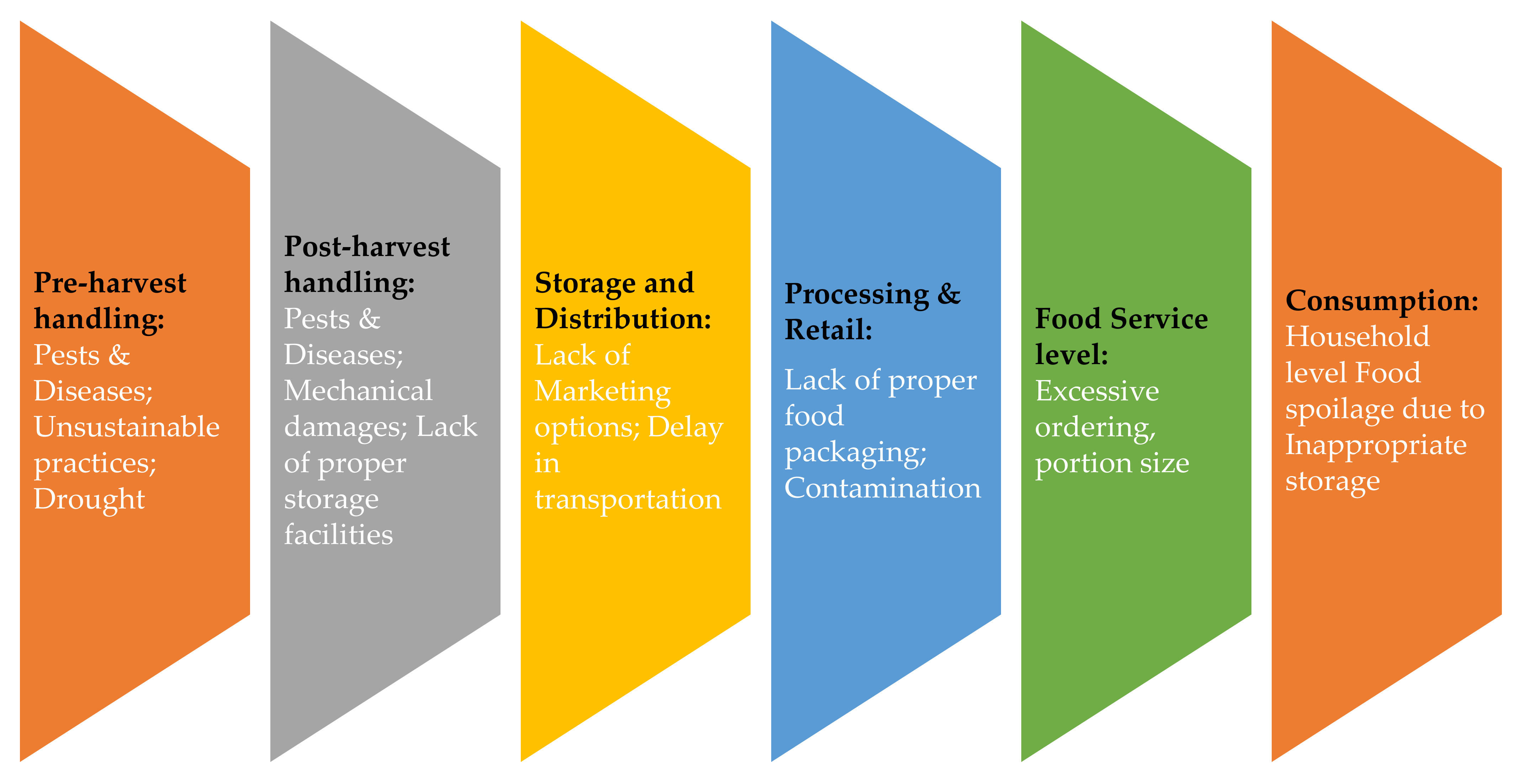
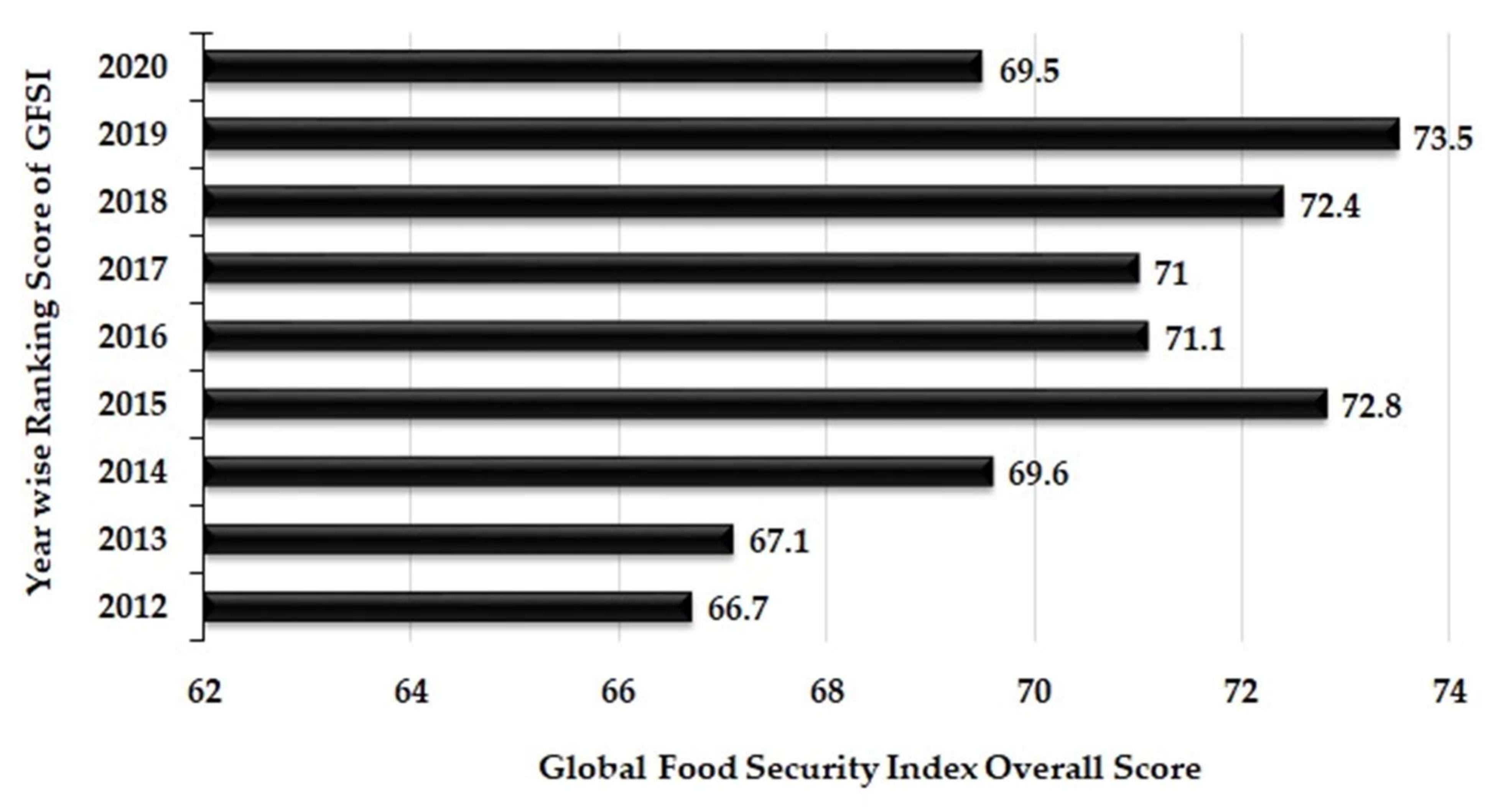
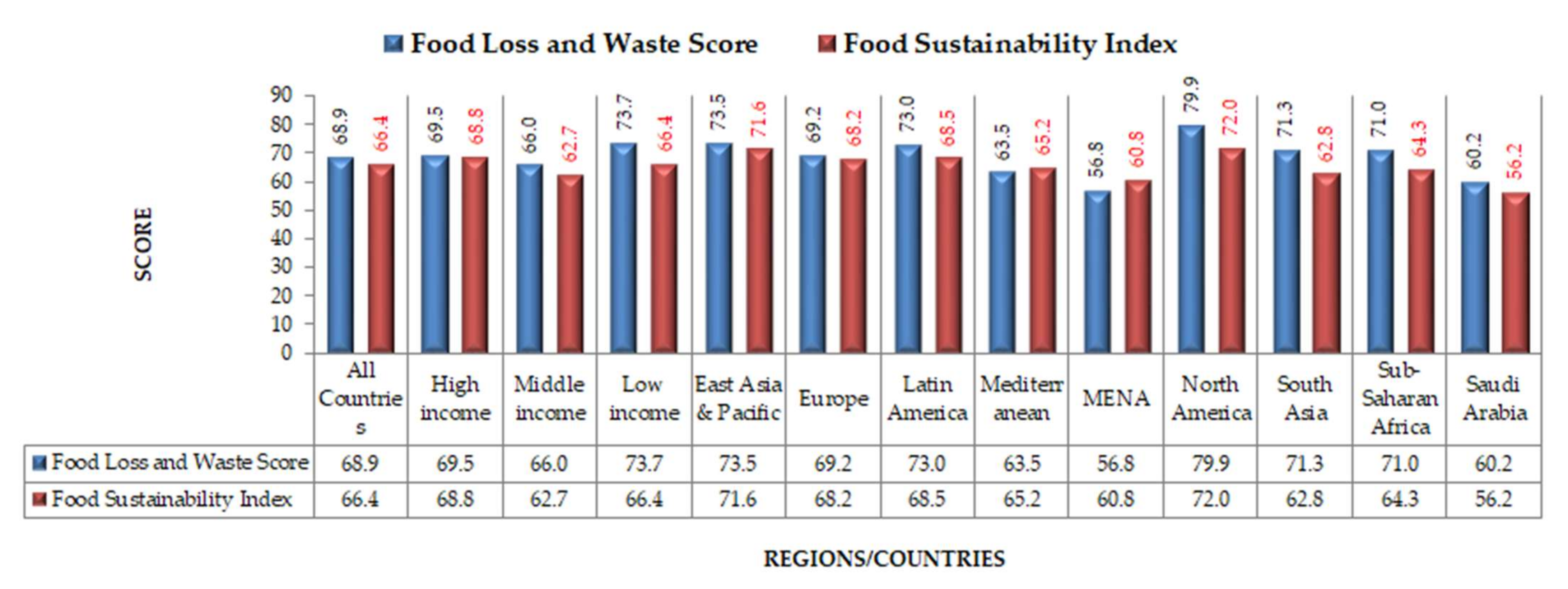

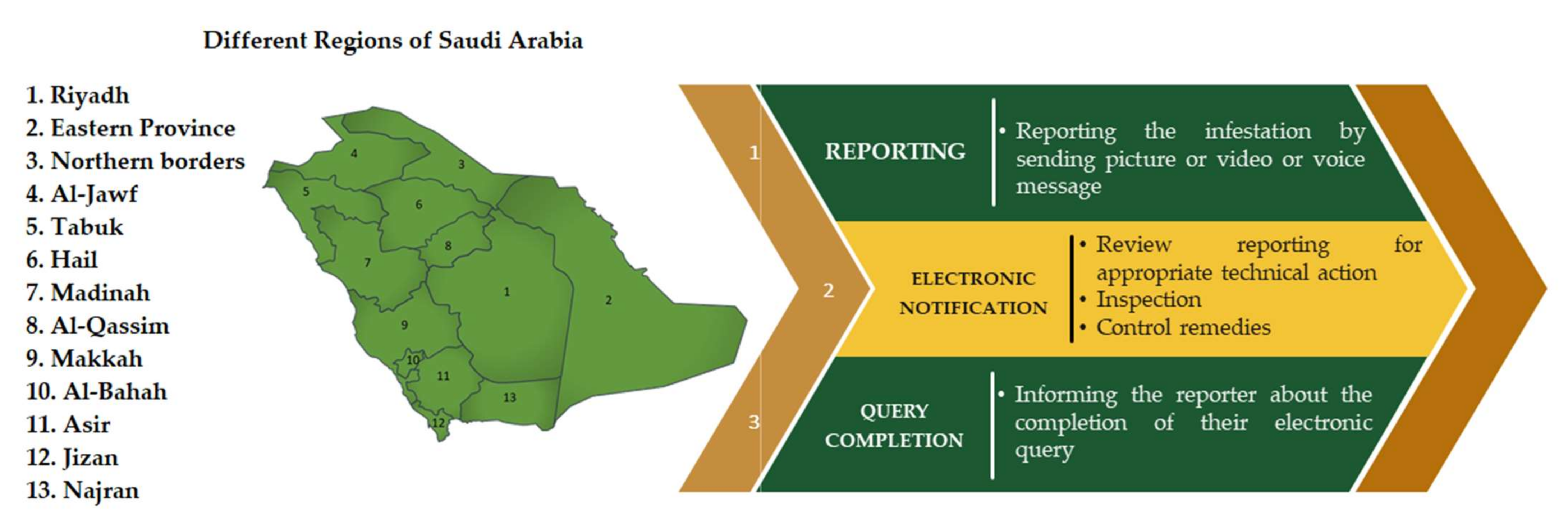
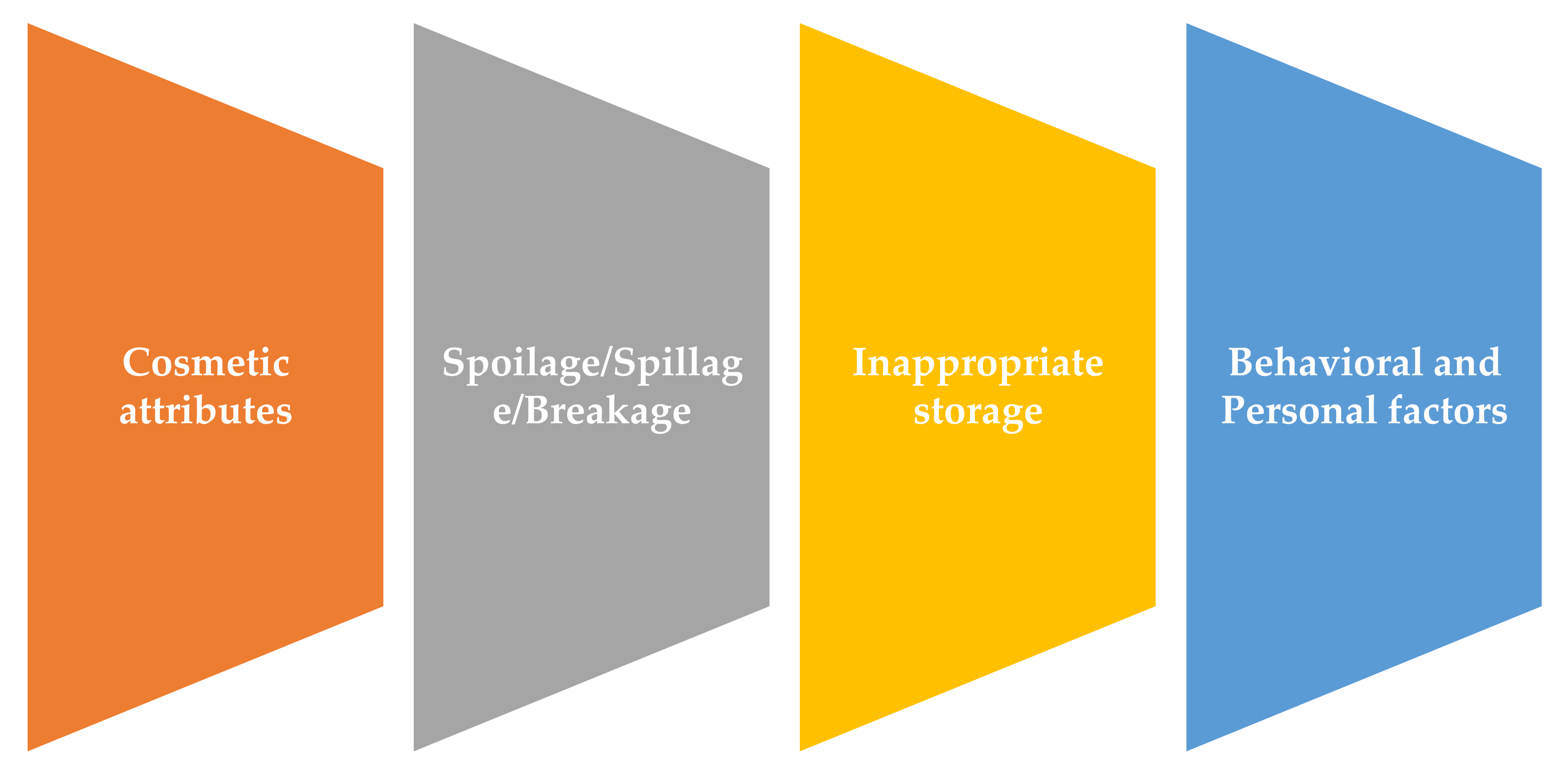
| Food Products | Volume of FLW (Tonnes) | Overall FLW Share (%) | Loss Share (%) | Waste Share (%) | Value of FLW (Million USD/Year) | Value of FLW (Million SR/Year) | Total FLW/Capita (kg/Capita/Year) |
|---|---|---|---|---|---|---|---|
| Poultry | 444,000 | 29.00 | 13.00 | 16.00 | 746 | 2799 | 13 |
| Unclassified Fruits | 608,000 | 40.00 | 22.50 | 17.50 | 602 | 2257 | 18 |
| Rice | 557,000 | 34.00 | 3.00 | 31.00 | 449 | 1682 | 17 |
| Unclassified Vegetables | 335,000 | 44.00 | 27.50 | 16.50 | 334 | 1252 | 10 |
| Wheat Flour Bread | 917,000 | 30.00 | 5.00 | 25.00 | 243 | 913 | 28 |
| Unclassified Meat | 41,000 | 43.00 | 24.00 | 19.00 | 165 | 619 | 1.2 |
| Dates | 137,000 | 21.50 | 16.00 | 5.50 | 157 | 588 | 5 |
| Fish | 69,000 | 33.00 | 18.50 | 14.50 | 132 | 494 | 2.4 |
| Watermelon | 153,000 | 41.00 | 32.00 | 9.00 | 68 | 254 | 5 |
| Carrot | 27,000 | 31.00 | 16.00 | 15.00 | 13 | 47 | 0.8 |
| Orange | 69,000 | 28.00 | 14.50 | 13.50 | 48 | 181 | 3 |
| Onion | 110,000 | 26.00 | 8.50 | 17.50 | 45 | 167 | 3.5 |
| Sheep | 22,000 | 15.00 | 7.00 | 8.00 | 107 | 401 | 0.7 |
| Tomato | 234,000 | 40.00 | 23.00 | 17.00 | 114 | 428 | 8 |
| Potatoes | 201,000 | 42.00 | 28.00 | 14.00 | 99 | 372 | 6 |
| Cucumber | 82,000 | 43.00 | 26.00 | 17.00 | 69 | 260 | 2 |
| Camel | 13,000 | 34.00 | 14.50 | 19.50 | 40 | 150 | 0.4 |
| Zucchini | 38,000 | 41.00 | 26.00 | 15.00 | 20 | 74 | 1.1 |
| Mango | 12,000 | 26.00 | 17.00 | 9.00 | 11 | 42 | 0.4 |
| Name | Waste Entity | Possible Outputs | Reference |
|---|---|---|---|
| Fruits | |||
| Apples | Peels, Pomace, and seeds, etc. | Food products, fuel, pectin extraction, animal feed, Phenolic compounds, antioxidants, dietary fibers | [34,35,36] |
| Banana | Peel/Skin | Laccase, α-amylase | [29,37,38] |
| Berries | Seeds, Pomace | Oil, phenolic compounds, antioxidants, fatty acids, tocopherols, phytosterols, dietary fibers, enriched cookies | [39,40,41] |
| Citrus fruits | Waste materials, rag, pulp, peels, seeds, etc. | Food processing, increase dietary fibers contents of sausages, bioactive compounds, flavonoids, polyphenols, dietary fibers, phenolic compounds, carotenoids, promising alternative as a fat replacer in ice cream production, essential oils, pectins | [42,43,44,45,46] |
| Grapes | Unripe grapes, Pomace, grape agro-waste | Bioactive phytochemicals, phenolic compounds | [47,48] |
| Kiwifruit | Pomace | Dietary fibers | [49] |
| Mangoes | Peel and seeds | Bioactive compounds | [50,51] |
| Melons | Barks, peels, and seeds | Antioxidants, bioactive compounds, food processing | [52] |
| Olives | Pomace | Natural phenolic antioxidants, bioactive compounds | [53,54] |
| Pear | Pomace | Dietary fibers | [49] |
| Pineapple | Core, crown, and peel parts of pineapples | Antioxidants, bioactive compounds, glycosides, polyphenols | [55,56] |
| Vegetables | |||
| Carrot | Pomace | α- and β-carotene | [57] |
| Onion | Brown skin and top–bottom, husk | Dietary fibers, bioactive compounds, phenolic compounds, flavonoids, fuel pellets | [58,59,60] |
| Tomato | Peel, pomace, and tomato waste | Bioactive compounds, natural additives, lycopene, beta-carotene, glutamic acid or aspartic acid, food products enrichment, ellagic and chlorogenic acids | [61,62,63] |
| Potato | Potato waste and peel | Bioactive compounds, antioxidants, glycoalkaloids and polyphenols, natural food additive | [64,65,66] |
| Mixture of vegetables | Vegetable wastes of potato, pumpkin, brinjal, cauliflower, and cabbage | Biobutanol, protease production, biomethane production | [67,68,69] |
Publisher’s Note: MDPI stays neutral with regard to jurisdictional claims in published maps and institutional affiliations. |
© 2021 by the authors. Licensee MDPI, Basel, Switzerland. This article is an open access article distributed under the terms and conditions of the Creative Commons Attribution (CC BY) license (https://creativecommons.org/licenses/by/4.0/).
Share and Cite
Al-Khateeb, S.A.; Hussain, A.; Lange, S.; Almutari, M.M.; Schneider, F. Battling Food Losses and Waste in Saudi Arabia: Mobilizing Regional Efforts and Blending Indigenous Knowledge to Address Global Food Security Challenges. Sustainability 2021, 13, 8402. https://doi.org/10.3390/su13158402
Al-Khateeb SA, Hussain A, Lange S, Almutari MM, Schneider F. Battling Food Losses and Waste in Saudi Arabia: Mobilizing Regional Efforts and Blending Indigenous Knowledge to Address Global Food Security Challenges. Sustainability. 2021; 13(15):8402. https://doi.org/10.3390/su13158402
Chicago/Turabian StyleAl-Khateeb, Suliman Ali, Abid Hussain, Stefan Lange, Mohammad M. Almutari, and Felicitas Schneider. 2021. "Battling Food Losses and Waste in Saudi Arabia: Mobilizing Regional Efforts and Blending Indigenous Knowledge to Address Global Food Security Challenges" Sustainability 13, no. 15: 8402. https://doi.org/10.3390/su13158402
APA StyleAl-Khateeb, S. A., Hussain, A., Lange, S., Almutari, M. M., & Schneider, F. (2021). Battling Food Losses and Waste in Saudi Arabia: Mobilizing Regional Efforts and Blending Indigenous Knowledge to Address Global Food Security Challenges. Sustainability, 13(15), 8402. https://doi.org/10.3390/su13158402







